Over the course of the last nine years in India, I’m somewhat ashamed to say that I can barely speak any of the local languages. To anyone that asks, I quickly point out that in Chennai at least, almost everyone speaks English to varying degrees of proficiency. In my office, amongst the marketing, sales and account management teams, the default language is English.

For that, I can thank the agitations of the early 1960s when the central Government of India wanted to impose Hindi as the national language across the country. The political parties in the south vehemently opposed the implementation of Hindi to conduct all official business and so the Dravidian movement was born.
In a big F-You to the central Government, English was selected as a second language taught in schools in the south over Hindi. The result? A population that is at ease talking to foreigners but will have great difficulty communicating to their fellow countrymen from the north of the country.
Indeed, take the company I work for. We have people from across India whose first languages are all different. The link language for the person from Mumbai, the person from Shillong and the person from Kerala is English.
Combined with my laziness, the absence of a pressing need and what my wife (who speaks four languages) has affectionately called my spectacular ineptitude at learning a new language, I’ve basically gotten by with a few keywords.
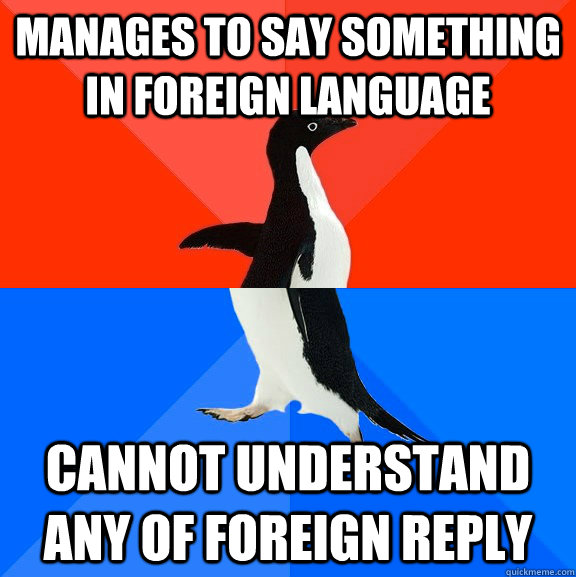
Funnily enough, if you are sitting in England right now reading this, you probably don’t realize how much Indian languages have influenced the words that you use every day. Are you perhaps sitting in a bungalow, reading this in your pyjamas before you jump in the shower to shampoo your hair? Perhaps you’ve got a tab open on your browser and reading an article that an economics pundit has written about how the 1% are continuing to loot the economy or how the urban jungle is affecting the health of children. Bungalow, pyjamas, shampoo, pundit, loot, jungle. All Hindi words.
The diamond isn’t the only thing the British took from India.
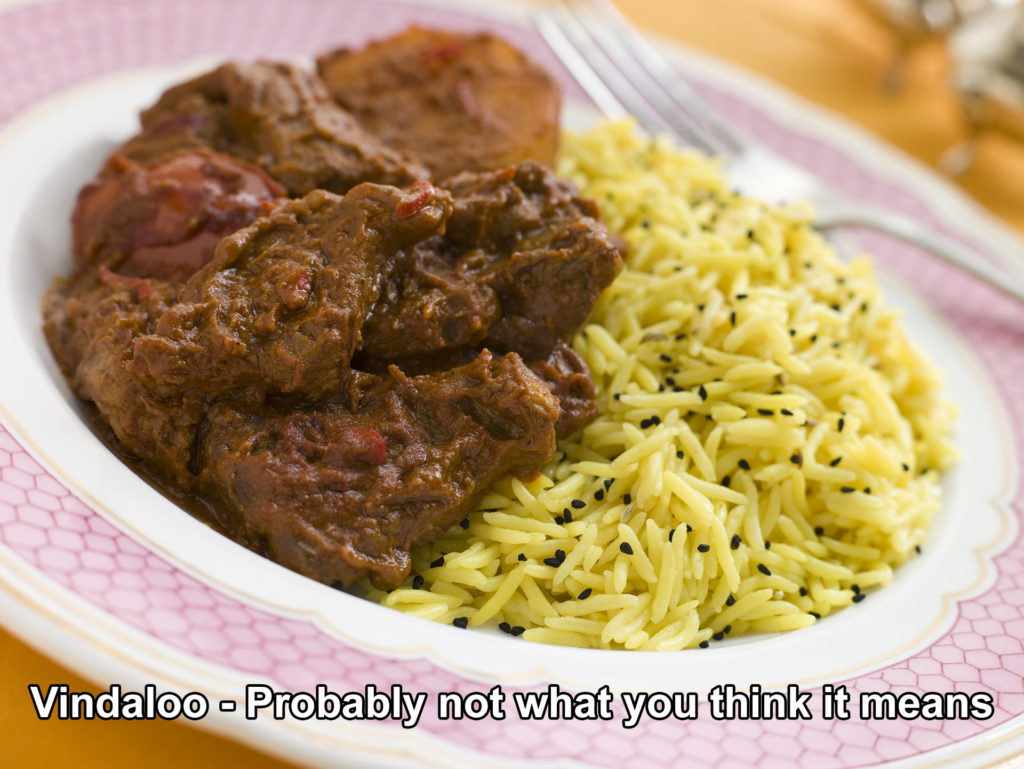
Chicken vindaloo? That originated in Goa and means let’s collect all the shit left over from the chicken that no one wants to eat, make it spicy as hell and then challenge some poor bastard to eat it as a test of his manliness after a night out on the tiles.
So it is that we’ve happily borrowed words and phrases from various Indian languages (there are over 120 of them) over the course of the last few centuries. I’m now tabling a proposal to add more words from various Indian languages to our everyday English vocabulary.
They are either better words for existing words, efficiently sum up something that would take a sentence to explain or add colour and description to our nouns.
1. Challo – literally “let’s go”

Why use two words when one will do? Why go through the effort of making our tongue do gymnastics to go from a “ts” sound to a “gh” sound? This Hindi word, Challo, rolls right off the tongue and is a pleasure to say. If you have any problems with it just think of it as a “hello” with a “c”.
Wife: “Hey Pete, stop playing video games, we need to go to shopping for new cushions!”
Me: “Just five more minutes!”
Wife: “You said that 10 minutes ago!”
Me: “OK, challo.”
Wife: 
Me: “We’re going to be late for the Star Wars movie, come on!”
Wife: 
Me: “What? Challo!”
Wife: … ️
️
2. Moonji – It’s your face, silly

A Tamil word and means face. For me to discover the meaning of the word, the conversation went a little something like this with my wife:
Me: “I’m telling you that the British acquired the diamond via legitimate means!”
Wife: “Aragh! Your moonji! I can’t even look at you right now!”
Me: “I’m not a moonji! You’re a moonji!”
Wife: …
Moonji is now perhaps my second favourite word and I will be naming my next cat Moonji.
3. Chuddy Buddy – Your bestest friend ever
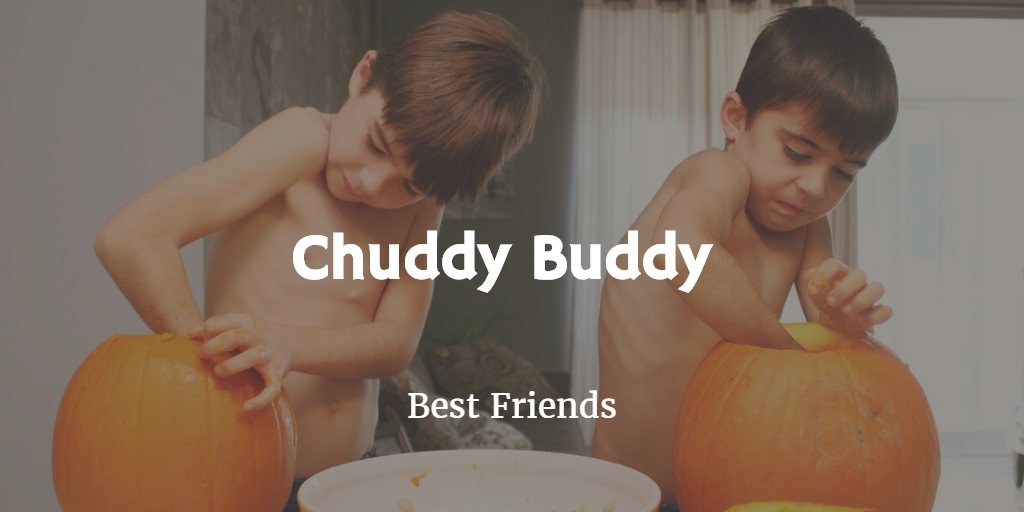
“Chuddies” is Hindi for underwear. “Look at that kid running around the street in his chuddies, he doesn’t care about anything, I wish I could be like that again.”
Your chuddy buddy is the person you used to run around the streets in your chuddies with. You would do everything together, nothing could tear you apart. Together you were going to conquer the world.
Me: “Have you seen M?”
Colleague: “No, he went off with his chuddy buddy for a smoke.”
She: “He doesn’t pay any attention to me any more.”
She’s Friend: “Yeah, but that’s how boys are, it happens in all relationships.”
She: “But all he seems to want to do is roam around on his motorbike with his chuddy buddies.”
4. Pavam – a label applied to someone who is seen as helpless or someone you feel sorry for
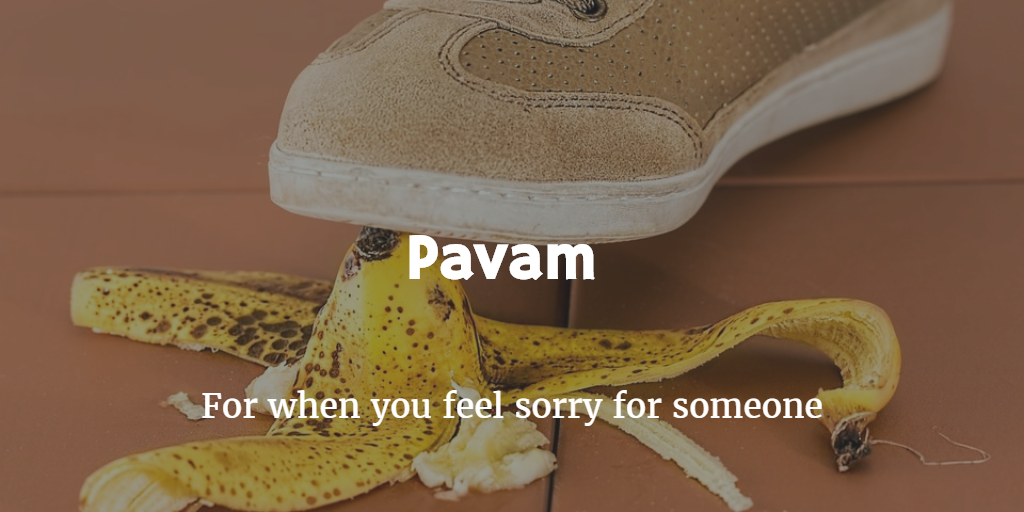
This is a Tamil word that doesn’t seem to have an English translation. Meek comes close, but doesn’t quite sum it up. Just like you might rate a person’s qualities as aggressive, courageous or sincere, pavam can be used to describe a quality that is either thrust upon the person or something that they are just born with. The only way to define it is to describe it.
Me: “Oh look, puppies!  ️”
️”
Wife: “Eeee! So many of them! But they are all trying to feed at once, poor mama dog, she can’t move, she’s so pavam.”
Wife: “How was your day?”
Me: “Terrible, I slipped as I got down from the train.”
Wife: “Oh no, are you ok?”
Me: “Yeah, that was OK, but as I slipped, my jeans got caught on the door and ripped right off. I was sprawled on the platform floor and everyone could see my chuddies :(”
Wife: “Oh you are so pavam.”
So basically someone is said to be pavam if something unfortunate happens to them or they are particularly submissive or they are in a sticky situation that they can’t get out of.
5. Chumma – to do something simply for the sake of it
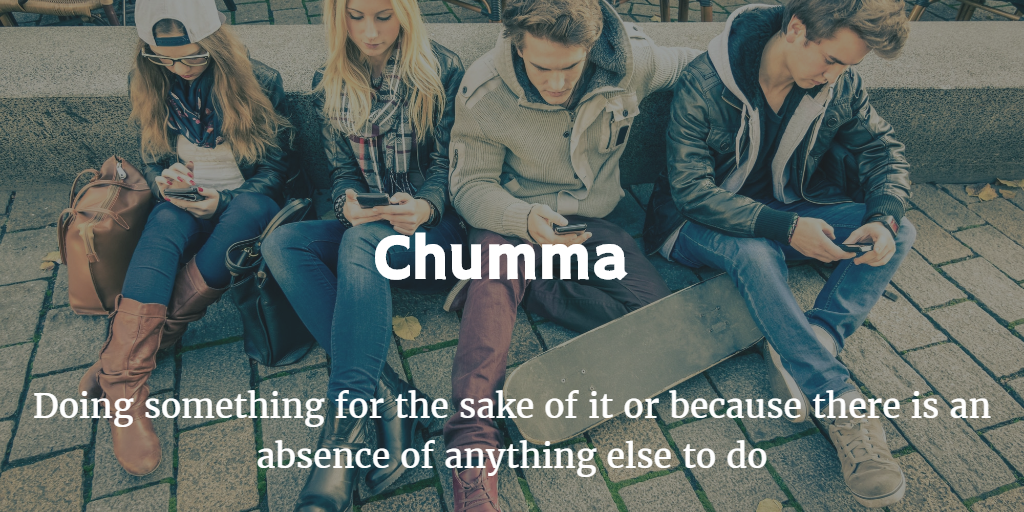
This is another Tamil word doesn’t have any direct single word translation. It can mean anything from passing time (phrased as “time-pass” in India) to doing something without a particular reason for doing it.
Wife: “What are you doing?”
Me: “Reading about the 19th century Klondike gold rush.”
Wife: “Why?”
Me: “Chumma.”
Me: “How come you decided to visit the library today then?”
Wife: “Chumma, was bored sitting at home all day. I wanted to go out somewhere.”
When I first started at Unmetric in 2012, we were such a young company that we didn’t even have official ID cards yet which was a problem because security at the IT park wouldn’t allow us to enter. To get around this, the young Director of Operations designed an ID card on powerpoint for the five employees, printed it out and had it laminated.
CEO: “This is awesome, man, it looks completely professional.”
V: “Thanks, I had no problem using it at the security gate so we don’t have to queue up for security passes now.”
CEO: “Excellent. What does this bar code on the front do?”
V: “Nothing, chumma I just added it because it looks good.”
Sometimes a word in one Indian language can mean something else entirely in another and that can lead to a series of unfortunate events. In this case, chumma in Hindi means something else, as a Tamil speaking female colleague discovered to her horror while having a conversation with a Hindi speaking male colleague who was coming to Chennai.
He: “Is there anything to do in Chennai? Can we do something?”
She: “No, there isn’t much to do here, we can just chumma hangout.”
H: “You want to chumma with me when I come?”
S: “Yeah. There’s not much to do here.”
H: “Erm, I’m married!”
S: “I know.”
H: “Oh, maybe you don’t know what chumma means.”
S: “Why what does it mean in Hindi.”
H: “To kiss, you were asking to kiss me when I came to the office.”
S: 
Naturally my colleague was mortified and was, to borrow a phrase I mentioned earlier, totally pavam. Fortunately we have a very understanding HR manager who can speak both Hindi and Tamil and understood the confusion and luckily no harassment cases were filed.
6. Bachha – a young child
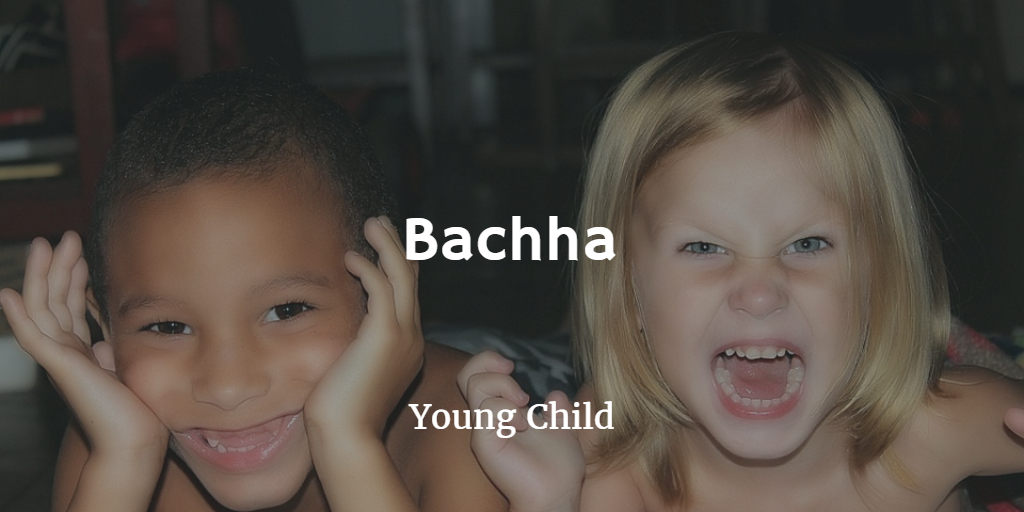
This Hindi word means young child. Imagine if you walked into a day care center, it will be full of bachhas. When there is a table tennis tournament going on in my office, some might say that the office sounds like it’s full of bachhas. You can also use the word to affectionately describe a group of people younger than you, but who are not children.
Colleague: “Sorry, Pete, you are so old that we couldn’t fit enough candles on your cake!”
Colleague 2: “Yeah, we asked them to make the cake as soft as possible so you don’t have to chew too much.”
Me: “Listen you little bachhas, I will make you work on the weekend.”
Wife: “Are you going out again to the pub this weekend?”
Me: “Yeah, of course, Man United are playing!”
Wife: “And you’re probably going to drink too much and complain about a hangover the next morning?”
Me: “Maybe.”
Wife: “Bachhas, all of you men!”
7. Kutty – the smallest thing
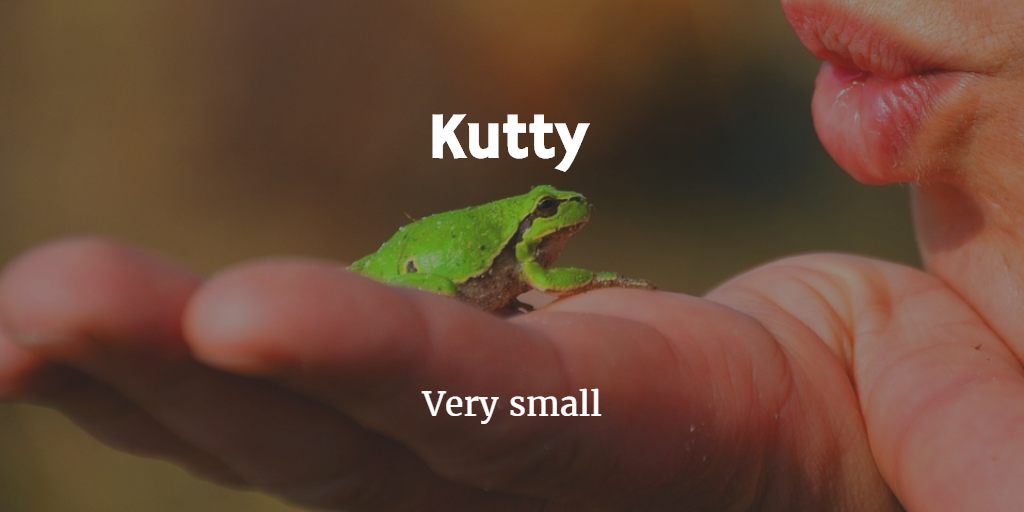
Kutty is the Tamil word for small. Often kutty is also used as an adjective to describe things or people deemed to be your junior. It goes a little something like this:
Wife: “How was your day at work?”
Me: “It was alright.”
Wife: “How are all your kutties?”
Me: “Yeah, they are fine.”
Or perhaps a conversation might go like this:
Colleague: “There is so much work to do, I’m never going to meet all these deadlines!”
Me: “Do you need a kutty to help you out?”
Colleague: “Yes, that would be awesome!”
Me: “OK, go to the colleges and see if you can find yourself an intern.”
8. Theek Hai Ma – Means OK when you are speaking to your Mother

I don’t know if this phrase should be added to the English language, but it certainly seems to get used an awful lot when my wife speaks to her mother. If you overhear a grown Tamil person speaking to their mother, you might hear the phrase “seri ma” in place of “theek hai ma”. How does it get used? It goes a little something like this…
Mother: “And you need to send a birthday card to your aunt in Bangalore.”
Daughter: “Theek hai ma.”
Mother: “And don’t forget to wish your cousin-sister happy anniversary tomorrow.”
Daughter: “Theek hai ma.”
Mother: “And your father and I will be out of town this weekend, so make sure your brother is ok.”
Daughter: “Theek hai ma.”
Mother: “And you should really speak to him more, he looks up to you.”
Daughter: “Ma! Theek hai ma.”
Mother: “Listen, I want no more of this theek hai ma business!”
Daughter: “…theek hai ma.”
Mother: “Good, now remember that next week I’m coming over with your uncle and Grandparents.”
Daughter: “Theek hai ma.”
Mother: “I’m going to bring roti and subji so you don’t have to cook anything but have some chai ready when we arrive.”
Daughter: “Theek hai ma.”
Mother: “We’ll be there about 1pm.”
Daughter: “Theek hai ma.”
Mother: “And don’t wear your jeans and an old t-shirt, wear that nice green salwar kameez you wore at Diwali.”
Daughter: “Theek hai ma.”
Mother: “And wear some jewellery, you never wear any.”
Daughter: “Theek hai ma.”
Mother: “I’m not asking you to wear everything, just some gold ear rings, necklace and bracelet.”
Daughter: “Theek hai ma.”
Mother: “Are you listening to me?”
Daughter: “Theek hai…yes ma.”
There are plenty of other words and phrases that I’ve borrowed over the years that have become a standard part of my vocabulary. I’m sure many of my old English friends will be utterly confused when I next talk about how a person is “putting scene” or when I start adding “it seems” after every sarcastic comment.
There are also a few words that the English language has borrowed from Indian languages that need to be unborrowed. Consider you are in an Indian restaurant. You’re going through the menu and to go with your curry you ask the waiter for some “naan bread“. Do you know what you’ve just asked for? Bread bread. Naan means bread. How about when you go to Starbucks and order yourself a lovely “chai tea“. Congratulations, you’ve just ordered tea tea! Chai means tea in Hindi. There are a few others, but perhaps I’ll save that for another blog post.
Do you have any favourite words from Indian languages that you think should be added to the English language?
Lol’ed at the Moonji usage! One little addition though. “Kutty” can also mean lady of the night. Usually used on Tamil men who look like they are out to have a good time.
Tout/pimp – kutty venuma? (Do you want a kutty?)
Wow, never knew that! I asked around the office and got mixed reactions. I double checked and they said I’m still OK to call young people kutties and I won’t be mistaken 🙂
Hahaha….this had me in splits! Enjoyed reading it! I would add “poda” and “Haanji”
Yes, “poda” gets used a lot in my office, mostly by me when my colleagues are teasing me about how awful the the England cricket team is.
(For non-Tamil speaking people, poda is a way to tell someone to get lost – you would never say it to an elder or someone you greatly respect, but it’s fine to say it to your close circle of friends or to the motorist who just cut you up and is now arguing with you at the traffic signal).
And “Haanji”? I don’t use this one quite as much.
(For non-Hindi speaking people, “haan” means “yes” and adding a “ji” to the end implies great respect to the person who is speaking to you – kind of like saying “Yes, sir?”).
Enjoyed reading this. I could imagine this entire article performed as a stand-up. It would be hilarious.
Oooo, maybe that will be my next career move. The sitting down stand-up comedian, because standing up is too much hard work.
hahaha!!! the chumma story was hilarious!!
What are Tamil emojis called?
“Moonjis”!!!
Haha, I love it 😀
What is the word for my love?
Hi Ruth, my colleagues tell me that the Tamil words for “my love” is: En anbe
Prounced: yen unbey
If you want to say “my dear” or “my sweetie”, you could say: en chellum
Sorry that I am now 63 years old. You would have been immensely useful if I were to learn new languages in my junior years. Sadly, in bengali society, no one cares for other languages or other societies in those days, bengalis always projected themselves as superior to others.
I love anything you write, Peter (beginning with your Chennai-expat book)!
“Aamaam” could be one of these words too.
If we were to list English words that have come to acquire special places in Chennai/Madras usage:
“super” (especially when pronounced “sooper!”) surely has to be one of them